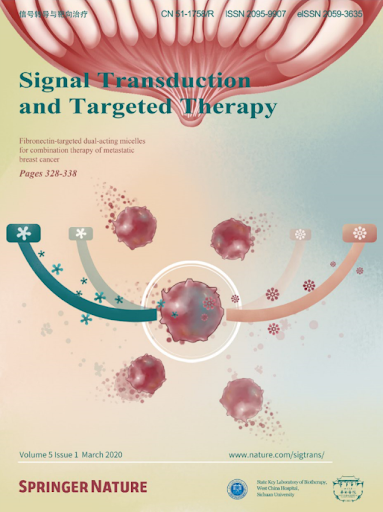First-line treatment of anti-EGFR monoclonal antibody cetuximab β plus FOLFIRI versus FOLFIRI alone in Chinese patients with RAS/BRAF wild-type metastatic colorectal cancer: a randomized, phase 3 trial.
IF 40.8
1区 医学
Q1 BIOCHEMISTRY & MOLECULAR BIOLOGY
引用次数: 0
Abstract
Cetuximab plus irinotecan, fluorouracil, and leucovorin (FOLFIRI) represents a first-line therapeutic standard for RAS/BRAF wild-type metastatic colorectal cancer (mCRC) patients. Despite this established approach, cetuximab β (CMAB009), as a modified antibody of cetuximab, prospectively selected for dual RAS/BRAF wild-type patients, has not yet been validated in the Chinese mCRC patients through phase 3 trial. In this study (ClinicalTrials.gov identifier: NCT03206151), patients with RAS/BRAF wild-type mCRC who were not suitable for radical resection were randomly assigned in a 1:1 ratio to receive cetuximab β plus FOLFIRI or FOLFIRI alone. The primary endpoint was blinded independent review committee-assessed progression-free survival (PFS). The secondary endpoints included overall survival (OS), objective response rate (ORR), disease control rate (DCR), surgery rate for metastasis and R0 resection rate, and safety. From January 4, 2018 to September 2, 2021, a total of 505 eligible patients were enrolled and received study treatment; the median follow-up duration was 8.7 months (95% confidence interval [CI], 7.77 to 9.29) and 5.9 months (95% CI, 5.63 to 6.65) in cetuximab β plus FOLFIRI group and FOLFIRI group, respectively. Compared to FOLFIRI alone, cetuximab β plus FOLFIRI demonstrated statistically significant improvements in median PFS (13.1 vs. 9.6 months, hazard ratio [HR], 0.639; 95% CI, 0.468 to 0.872; P = 0.004), median OS (28.3 vs. 23.1 months, HR, 0.729; 95% CI, 0.551 to 0.965; P = 0.024), and ORR (69.1% vs. 42.3%, odds ratio, 3.090; 95% CI, 2.280 to 4.189; P < 0.001). Cetuximab β plus FOLFIRI exhibited manageable toxicity without novel safety signals. This study demonstrated that cetuximab β plus FOLFIRI provided significant clinical benefits as a first-line treatment for patients with RAS/BRAF wild-type mCRC. Compared to FOLFIRI alone, cetuximab β plus FOLFIRI therapy led to prolonged median PFS and OS while maintaining a manageable safety profile, offering a new treatment option for this patient population.抗egfr单克隆抗体西妥昔单抗+ FOLFIRI对中国RAS/BRAF野生型转移性结直肠癌患者的一线治疗:一项随机3期试验
西妥昔单抗联合伊立替康、氟尿嘧啶和亚叶酸钙(FOLFIRI)是治疗RAS/BRAF野生型转移性结直肠癌(mCRC)患者的一线治疗标准。尽管有这种既定的方法,西妥昔单抗β (CMAB009)作为西妥昔单抗的修饰抗体,有望用于RAS/BRAF双重野生型患者,但尚未在中国mCRC患者中通过3期试验进行验证。在这项研究(ClinicalTrials.gov identifier: NCT03206151)中,不适合根治性切除的RAS/BRAF野生型mCRC患者按1:1的比例随机分配接受西妥昔单抗+ FOLFIRI或单独使用FOLFIRI。主要终点是盲法独立审查委员会评估的无进展生存期(PFS)。次要终点包括总生存期(OS)、客观缓解率(ORR)、疾病控制率(DCR)、转移手术率、R0切除率和安全性。2018年1月4日至2021年9月2日,共有505例符合条件的患者入组并接受研究治疗;西妥昔单抗+ FOLFIRI组和FOLFIRI组的中位随访时间分别为8.7个月(95%可信区间[CI], 7.77 ~ 9.29)和5.9个月(95% CI, 5.63 ~ 6.65)。与单独使用FOLFIRI相比,西妥昔单抗+ FOLFIRI的中位PFS有统计学意义的改善(13.1个月vs 9.6个月,风险比[HR], 0.639;95% CI, 0.468 ~ 0.872;P = 0.004),中位OS(28.3个月vs. 23.1个月,HR, 0.729;95% CI, 0.551 ~ 0.965;P = 0.024), ORR (69.1% vs. 42.3%,优势比3.090;95% CI, 2.280 ~ 4.189;p < 0.001)。西妥昔单抗+ FOLFIRI表现出可控的毒性,没有新的安全信号。该研究表明,西妥昔单抗+ FOLFIRI作为RAS/BRAF野生型mCRC患者的一线治疗提供了显着的临床益处。与单独使用FOLFIRI相比,西妥昔单抗+ FOLFIRI治疗延长了中位PFS和OS,同时保持了可管理的安全性,为该患者群体提供了新的治疗选择。
本文章由计算机程序翻译,如有差异,请以英文原文为准。
求助全文
约1分钟内获得全文
求助全文
来源期刊

Signal Transduction and Targeted Therapy
Biochemistry, Genetics and Molecular Biology-Genetics
CiteScore
44.50
自引率
1.50%
发文量
384
审稿时长
5 weeks
期刊介绍:
Signal Transduction and Targeted Therapy is an open access journal that focuses on timely publication of cutting-edge discoveries and advancements in basic science and clinical research related to signal transduction and targeted therapy.
Scope: The journal covers research on major human diseases, including, but not limited to:
Cancer,Cardiovascular diseases,Autoimmune diseases,Nervous system diseases.
 求助内容:
求助内容: 应助结果提醒方式:
应助结果提醒方式:


